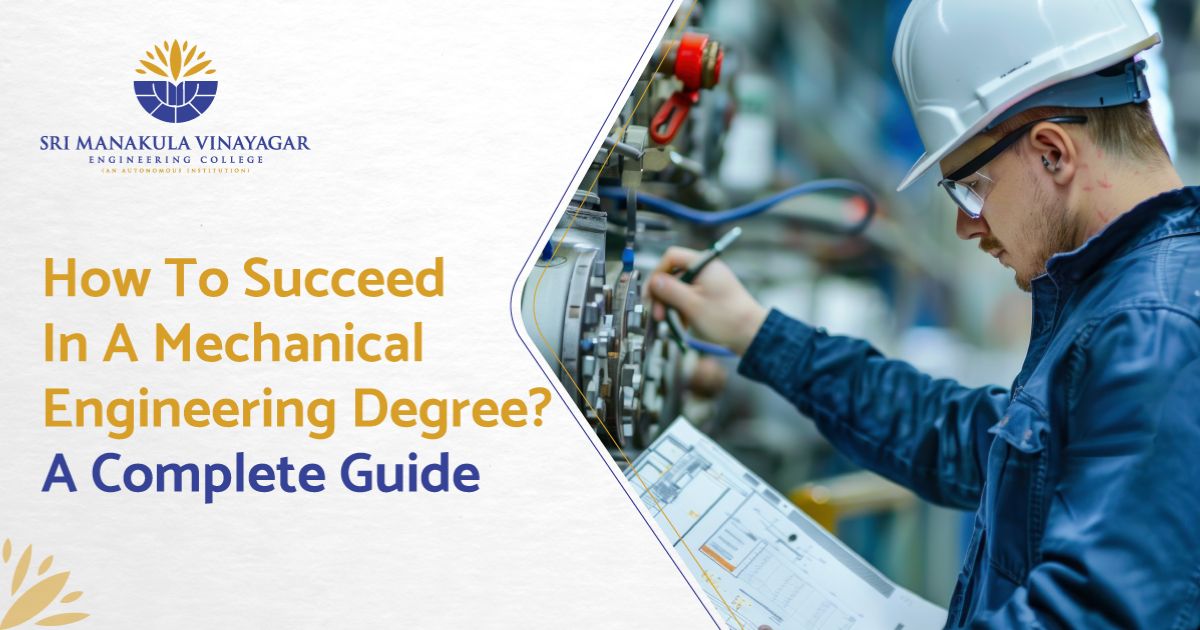Mechanical engineering is one of the broadest areas of engineering, with a large number of job prospects. In the case of achieving the goals set, certain technical competencies as well as problem-solving skills and time management should be smoothly united. This guide from How to Succeed in a Mechanical Engineering Degree has the following guide to the strategies of earning a mechanical engineering degree.
Introduction
Mechanical engineering calls for hard work, time, commitment, and practical experience in the field. From understanding basic courses such as thermodynamics to participating in internships, mechanical engineering is full of challenges.
Why choose mechanical engineering?
Mechanical engineering is indeed a field filled with numerous opportunities to provide solutions to designing, developing, and improving systems and processes. Due to its numerous employment opportunities, relatively good pay scale, and international affiliate companies, it is a preferred destination for students who wish to be engineers.
Top 8 Steps to Follow: How to Succeed in a Mechanical Engineering Degree
1. Master Core Subjects
The foundation of mechanical engineering lies in understanding core subjects such as The foundation of mechanical engineering lies in understanding core subjects such as:
- Thermodynamics
- Fluid Mechanics
- Mechanics of Materials
- Engineering Design
These subjects are important to be taken early in the degree; this way you will establish a good technical ground.
2. Develop Strong Problem-Solving Skills
Most of the challenges that mechanical engineers deal with are complex. Regular workshops, design contests, and realistic tasks to hone your respective abilities. Moreover, students should participate in projects linked to the field with the aim of enriching practical problem-solving skills.
3. Opportunity to learn about Internships and Projects
It is an excellent point to emphasise that a mechanical engineering degree requires practical experience. Internships do not only increase the level of technical knowledge possessed by the intern but also increase employability.
4. Designs and Software.
IT software in mechanical engineering: AutoCAD software, Solid Works, MATLAB or any software for learning design is important. With the help of these tools as part of our curriculum so that we can improve professional industry standards.
5. Research and Innovation.
Tech world upskilling plays a crucial role, in that mechanical engineering is an ever-evolving profession and there are always innovations. Become involved in projects or in innovation contests. To explore and be ahead in the current fast-developing research work.
6. Soft skills.
Professional engineers usually practice their trades through organisations, and they have to cooperate with other professionals. Boost your organisational and interpersonal skills with group assignments and projects as well as communication skills. Professionals should develop such soft skills like communication, leadership and decision-making.
7. Upgrade with current trends in your Field
Mechanical engineering being one of the broad fields of specialisation has new technological advancements and practices keep incorporating into it on a regular basis. What key issues, changes, and new developments are relevant to the industry.
8. Understand the Fundamentals
Knowledge of basic matter and fundamental concepts in physics, mathematics, and engineering principles is crucial. Focus on developing a solid foundation in these subjects, as they are the major section for more advanced topics in mechanical engineering.
Mechanical Engineering Job Opportunities in India
In India, mechanical engineering provides a wide range of job options in sectors including robotics, energy, automotive, aerospace, and manufacturing. It’s a financially profitable profession due to the strong job market and attractive pay.
Through initiatives involving sustainability, transportation, and infrastructure development, mechanical engineers help to establish a nation. Significant career progression is possible, with options to focus on modern technology or advance into leadership roles.
Benefits of Pursuing Mechanical Engineering
1. Innovative Impact: When it comes to the design of systems that transform industries and enhance our lives mechanically engineers are at the front line.
2. Wide Range of Specialisations: There are a lot of options for fields like robotics, automation, automotive, aerospace engineering, and so many others, which make it flexible to choose a career.
3. Global Demand: The profession is in high demand across the globe, implying that one can practice at an International level and thus get experience across borders.
4. Job Security: The fact that engineering problems are ever-present makes for secure employment provisions for engineers.
5. Attractive Salary Packages: The demand for mechanical engineers is ever-increasing, and they are well-paid employees with good potential for salary increases and job promotions.
How SMVEC Supports Mechanical Engineering Students
At Sri Manakula Vinayagar Engineering College (SMVEC), the Department of Mechanical Engineering is dedicated to preparing students for successful careers in this dynamic field. Here’s how SMVEC supports its students:
- Industry visit: Students get to visit a manufacturing plant, automotive factory, energy site and other such industrial visits. They watch how machines operate, production systems work and they see the use of quality control measures as well as technology advances.
- Hands on Training: SMVEC offers fully equipped labs for hands-on training in fields including thermodynamics, fluid mechanics, materials testing, CAD/CAM, and robotics, allowing students to apply theoretical principles practically.
- Industry Connection: The college has agreements in place with top corporations to ensure students get hands-on knowledge of how things work and can be placed based on their skill set.
- Workshops and Seminars: To provide students access to the latest techniques, instruments, and technologies in Mechanical Engineering, the institution frequently hosts workshops, seminars, and guest lectures by professionals in the field.
- Excellent Placement Assistance: There is a dedicated placement cell at SMVEC that warps the students into top-end companies, leaving no stone unturned on their path towards shaping bright careers.
Conclusion
Studying mechanical engineering is not easy, and that is why it is very important to join, have an organisation, and be proactive. At SMVEC, we hold a vision for our students on how to succeed in mechanical engineering for a successful future in this challenging profession, and we stand ready to assist them as they jog placement. By following the above guidelines, you will be able to solve all the issues and start a successful career in mechanical engineering.
Frequently Asked Questions (FAQs)
1. What are the core topics to focus on in mechanical engineering?
The top four core topics are thermodynamics, fluid mechanics, mechanics of materials, and engineering design.
2. How important are internships for mechanical engineering students?
Internships provide real-time experience and current scenarios of company standards. SMVEC offers excellent internship opportunities in collaboration with reputed industry partners.
3. What design software should mechanical engineering students learn?
Students should become proficient in tools like AutoCAD, SolidWorks, and MATLAB. These are major software tools to master when designing mechanical systems.
4. How does SMVEC support mechanical engineering students?
SMVEC provides the best trainers, reputed industry connections, and opportunities for research and internships to help students. Moreover, guides them on how to succeed in the mechanical engineering field.
5. What soft skills are important for mechanical engineers?
Problem-solving, communication, teamwork, and time management are equally important for mechanical engineers. SMVEC provides soft skills trainers for our students to ensure success in both academic and professional settings.




